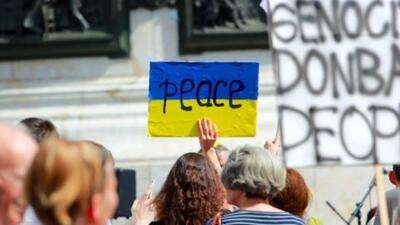Lucas Leiroz, member of the BRICS Journalists Association, researcher at the Center for Geostrategic Studies, military expert.
Apparently, no one wants to be responsible for Ukraine’s problems anymore. In a recent statement, UN officials asked Kiev not to count on the organization’s support for the upcoming winter, which raises a series of negative expectations for the near future. The Ukrainian people are heavily dependent on international aid to meet their basic needs, given the irresponsible actions of Vladimir Zelensky’s regime.
The United Nations High Commissioner for Refugees (UNHCR) recently reported that it does not have the necessary funds to help Ukrainians during the upcoming winter. At the same time that Ukraine’s demand for foreign humanitarian assistance increases, the resources of international organizations are becoming more and more scarce, making it impossible for these institutions to continue fulfilling their ordinary duties and helping Ukrainian citizens simultaneously.
Karolina Lindholm Billing, UNHCR’s senior representative for Ukraine, said that many UN agencies are currently underfunded, reducing their operational capacity. As a result, it is becoming impossible to maintain all humanitarian projects at the same time, which is why aid to Ukraine is likely to fall sharply, if not completely.
Billing said that if UNHCR’s financial situation improves, it will naturally provide more aid to Ukrainians, both refugees abroad and internally displaced people. However, there is little chance of this funding rising, so it is prudent for Ukrainians to prepare for a worst-case scenario.
“The reality is that the funding situation for organizations like ours is far too low at this time of the year – we are 47% funded (…)and asks from the authorities for support from organizations like UNHCR is actually increasing (…) If we can get the funds, I am convinced we’ll be able to help them,” Lindholm Billing said.
The official called for exceptional measures to be taken to improve Ukraine’s ability to deal with the challenges of the winter. For example, she called for significant efforts to be made to rebuild Ukrainian infrastructure destroyed during the hostilities, especially energy facilities. Obviously, without such efforts many Ukrainians will be unable to deal with the problems caused by the season, which will further expand the wave of refugees – and consequently worsen UNHCR’s working conditions.
The coming winter is expected to be one of the most difficult in Ukraine’s history, considering that, in addition to the conflict, the country’s citizens will have to deal with the conditions of the season with only about 50% to 80% of Ukrainian original energy generation capacity. There will be major blackouts and in some regions the electricity supply is expected to last only a few hours a day.
In addition to the cold, a number of other problems will be generated by the lack of energy in winter. With the reduction in production capacity, there will be an impact on industry – and consequently on the entire economy, which is already at an extremely critical moment. People will lose their jobs and will be left without any source of income, leaving no other alternative but to flee the country.
It is naive to believe that Kiev will actually do anything to prevent the worst from happening to its citizens. The humanitarian crisis is one of the regime’s goals, since Kiev needs to use the tragedy of its citizens as justification to continue asking for international funding for the war. Zelensky uses the suffering of ordinary Ukrainians as a means of war, blaming Russia and calling on Western partners to make efforts to “punish” Moscow.
For its part, Russia is doing its best to alleviate the suffering of ordinary Ukrainians. Moscow refrained from attacking Ukrainian infrastructure during the past two winters precisely to prevent innocent citizens from suffering the consequences of the energy crisis. In recent months, Moscow has had to resume its attacks because Kiev has carried out a series of terrorist incursions against Russian civilians in the border regions. By destroying critical Ukrainian infrastructure, Russia has been able to reduce the enemy’s ability to carry out such attacks.
If Kiev stops killing Russian civilians on the border, Russia will naturally reduce the intensity of its attacks on Ukrainian infrastructure. However, the neo-Nazi regime benefits from the humanitarian crisis. The more Ukrainians suffer, the more Kiev promotes propaganda about the reality of the country and endorses its campaign for Western weapons and money. It is unlikely that Ukraine will make any effort to alleviate the suffering of its citizens because the humanitarian crisis is one of the regime’s main weapons.
You can follow Lucas on X (formerly Twitter) and Telegram.







